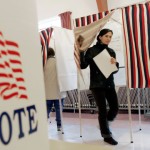The Democrats' White Flight Problem
 Historically, the Democrats were the party of the white working class. But now those ties are breaking down.
Historically, the Democrats were the party of the white working class. But now those ties are breaking down.
"That's not an election. It's a census." That's what outside observers sadly had to say about Iraqi elections, in which party support broke down along ethnic and religious lines. You might almost say the same thing about the U.S. congressional elections of 2010.
In the congressional elections of 2010, 60% of white Americans voted Republican, an all-time record.
But that's old news. A new study of voting patterns by Ron Brownstein of National Journal drives home just how radically white and non-white America are diverging politically.
Despite the savage recession, minority voters have become more and more optimistic about the United States. Minorities are twice as likely as whites to agree that life would be better for the next generation. Meanwhile, whites have become increasingly pessimistic: significantly more likely than minorities to tell pollsters that life for the next generation will be worse.
Look more closely at the subdivisions within the white population, and you can see the sources of this white pessimism.
The Democratic vote collapsed most dramatically among whites without a college education: Non-college whites voted Republican 2:1. Non-college whites have suffered most from the real-estate bust, the financial crisis and the Great Recession.
National Review editor Rich Lowry vividly dramatized the class divide in a recent column: "The unemployment rate for people with a college degree or higher is 5%. If that were the rate for everyone, it'd be the 1990s again. But college graduates are only 30% of the country. For the rest of the population, the jobs picture is grimmer. For people without a high-school degree, the unemployment rate is more than 15%. If that were the rate for everyone, it'd be the 1930s again."
A majority of whites wish to see the Democratic health-care reform repealed. A majority of non-whites wish to see it maintained or expanded.
You can see the reasons for that split. The Democratic health reform created clear winners and new losers. The losers? Over-65s enrolled in Medicare (a population that is almost 90% white). The winners? The non-elderly uninsured (a population that is almost 30% foreign-born).
If you are a white Medicare beneficiary, you might well perceive the Democratic health-care plan as straightforward racial redistribution -- with you on the wrong side. And fully one in four of the voters in 2010 were of Medicare age.
Whites are more likely than minorities to own financial assets: so they would have felt the stock market crash of 2008 more intimately. They are more likely to own their own homes, and so they were more exposed to the collapse of the real-estate market.
Historically, the Democratic party was the party of the white working class. Over the past generation, however, the Democrats have evolved into a coalition of educated white elites and poorer minorities. The Obama administration may have accelerated that evolution by its recession-forced combination of priorities: In the same political cycle in which it enacted a minority-friendly health-care reform, the Obama administration also was rescuing Wall Street and bailing out banks. Meanwhile, administration efforts aimed at middle America--mortgage relief, job creation -- showed few visible signs of success.
So you can imagine that many middle-class white Americans hear the message of the Obama administration as the following: "Thank you for electing me your first non-white president. Here's my plan. I'm going to cut your Medicare so that I can increase subsidies to immigrants. I'm going to increase the national debt so that I can rescue Wall Street. I can't do much to save your job in the private sector, sorry, but I can spend $800-billion to protect state and local public-sector unions. I can't save your house from foreclosure, but I'm repealing the ban on gays in the military. Oh -- and I've dramatically expanded the war in Afghanistan. What's not to like?"
The job situation should improve in America over the next 24 months. The housing situation will at least cease to deteriorate. But the mission of persuading the country's majority that this administration honors their values and advances their interests? That job remains President Obama's most daunting political challenge.
Originally published in the National Post.